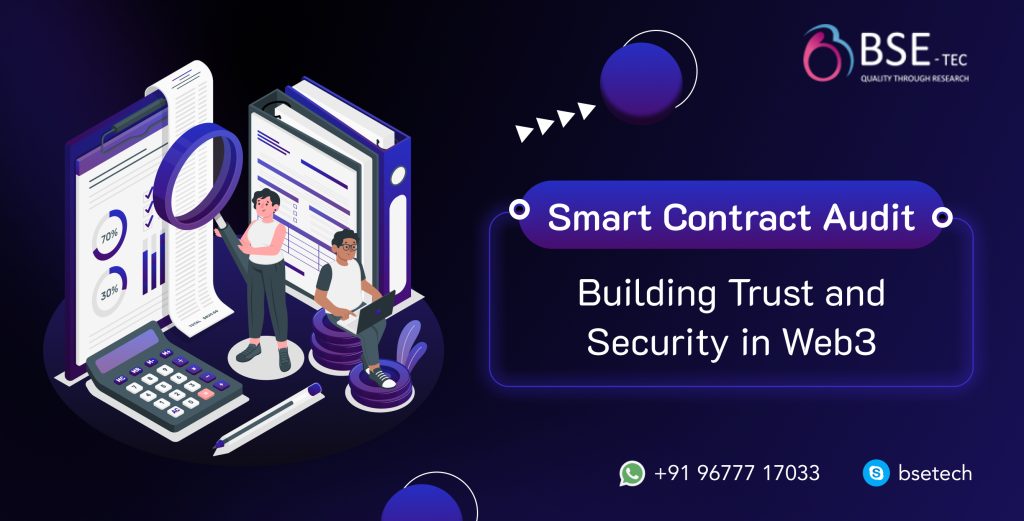
The rise of Web3 has transformed the digital landscape, emphasizing decentralization, transparency, and user empowerment. At the core of many Web3 applications are smart contracts—self-executing agreements that automate transactions and operations on blockchain networks. Ensuring their security and reliability is paramount, which is where smart contract audits come into play. Let’s explore these concepts and understand their importance.
What is a Smart Contract?
A smart contract is a computer program stored on a blockchain that automatically executes, controls, or documents legally relevant events and actions based on predefined rules. Unlike traditional contracts, smart contracts run directly on blockchain networks like Ethereum, Binance Smart Chain, or Solana, ensuring transparency, immutability, and decentralized execution.
For example, a smart contract can hold funds in escrow and release them once certain conditions—like delivery of goods—are verified. They enable trustless interactions between parties without intermediaries.
What is a Smart Contract Audit?
A smart contract audit is a thorough review and analysis of a smart contract’s code before deployment. This process identifies potential vulnerabilities, bugs, or security flaws that could be exploited by malicious actors. Auditors assess the logic, security measures, and compliance with best practices to ensure the contract functions as intended.
An effective audit helps prevent exploits that could lead to substantial financial losses or damage to reputation. It is a vital step in the development life cycle of any serious Web3 project.
The Role of Development Companies in Building Trust in Web3
Web3 development firms play a pivotal role in ensuring the security, reliability, and trustworthiness of blockchain projects. Their contribution goes beyond mere coding: they adopt a holistic approach that includes:
- Secure Design and Development: Following industry standards and best practices for coding safe and efficient smart contracts.
- Rigorous Auditing: Conducting multi-layered audits to uncover vulnerabilities. They employ a team of experienced security experts who use a combination of manual review and automated tools.
- Transparency and Reporting: Delivering detailed audit reports that clearly outline potential issues, recommended fixes, and security assurances.
- Post-Audit Monitoring: Providing ongoing security assessments and updates to adapt to emerging threats.
- Community Trust: Engaging transparently with users and stakeholders to foster confidence in their projects.
How BSEtec Develops Trust and Security in Web3
BSEtec is committed to advancing blockchain security through meticulous smart contract development and auditing processes. Here’s how they do it:
1. Expertise and Experience
Our smart contract developer team comprises blockchain security specialists with extensive experience in auditing complex SmartContracts across various platforms like Ethereum, Binance Smart Chain, and more.
2. Comprehensive Audit Process
- Code Review: Manual inspection to understand logic, identify anomalies, and verify adherence to standards.
- Automated Testing: Utilizing cutting-edge tools to scan for common vulnerabilities such as reentrancy, overflow, or underflow errors.
- Simulation and Testing: Stress testing contracts under different conditions to ensure robustness.
3. Transparent Reporting
As a leading blockchain development company we provide detailed audit reports, clearly listing vulnerabilities, potential exploits, and recommended fixes. This transparency builds confidence among project teams and users.
4. Iterative Security
Post-audit, we often collaborate with developers to implement fixes and re-test, ensuring that vulnerabilities are addressed comprehensively.
5. Ongoing Support
Beyond initial audits, we offer continuous monitoring services to safeguard projects as they scale, adapt, and face new security challenges.
Why Are Smart Contract Audits Required and Where Are They Used?
Why Are They Required?
Risk Prevention
Detecting vulnerabilities early prevents exploits — such as the famous Compound bug or the Parity Wallet issues — that have led to billions in losses.
Trust and Credibility
Investors and users are more likely to participate in projects that demonstrate due diligence through audits.
Compliance and Legal Assurance
Audits help projects meet industry standards and legal requirements, reducing liability.
Where Are They Used?
- DeFi Platforms: Lending, borrowing, and trading protocols.
- NFT Marketplaces: Ensuring transparent and secure transactions.
- Decentralized Autonomous Organizations (DAOs): Governance and voting systems.
- Token Launches: Initial Coin Offerings (ICOs) and token distributions.
In essence, smart contract audits are indispensable across all sectors where blockchain-based agreements are in use, ensuring safety and fostering confidence in Web3 ecosystems.
In the rapidly evolving landscape of Web3, trust and security are paramount. Smart contract audits are the foundation of this trust — preventing exploits, ensuring correct functionality, and elevating user confidence. The Web3 development companies are instrumental in this ecosystem, offering expert development and rigorous audits that make decentralized applications safer and more reliable.
By prioritizing security at every step, BSEtec helps Web3 projects build a trustworthy future, fostering adoption and innovation in decentralized technology.
Did you find this article useful? Let us know by leaving a comment below, or join us on Twitter and Facebook.


